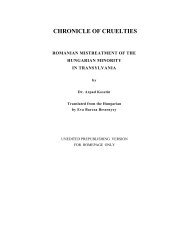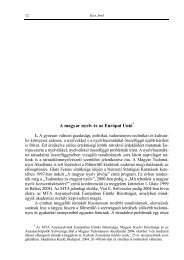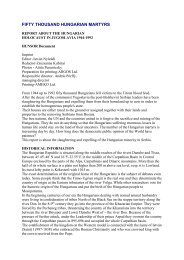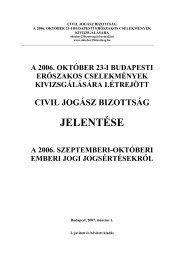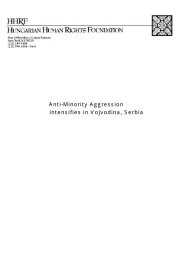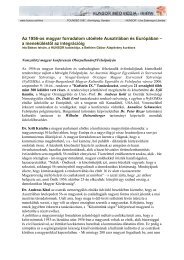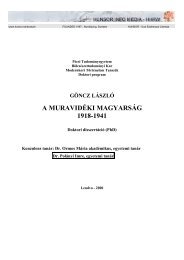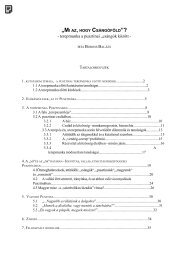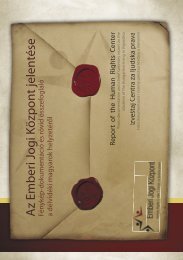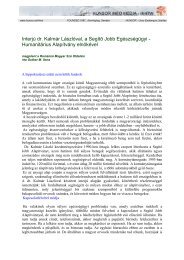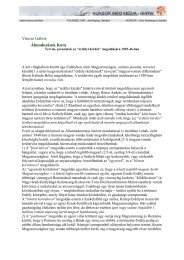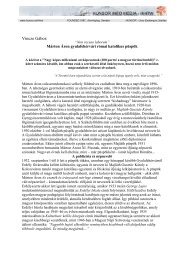everyone to the front! The Party used the same slogan to recruit people of Hungarian nationalityinto the Yugoslavian Liberating Army. For this purpose the party organization of Bacstopolyasent two deputies to Novi Sad to see General Kosta Nadj, Commander in Chief of theYugoslavian Liberating Army and of the staff of the Vojvodinan partisan troops. The deputiesasked General Nadj to give permission to create the Hungarian Brigade in Vojvodina. Theysuggested that, after the example of the Slavonian Hungarian Battalion, they name it after SandorPetofi.The creation of the Hungarian Brigade was instituted by an order of the High Commandon November 23, 1944."It is not known whether the two party members from Topolya gave an account of the fact,that the partisans in their territory had already tortured and executed 360 Hungarians. They didsay that in 1941 some seventy Serbians from Topolya lost their lives in the shootings.Even if they admitted that it was a vendetta five times over; as a threat, they suggested tothe Hungarians that they become partisans, just to give them their chance to remain alive.In the light of these facts, can we judge the following?"The voluntary recruiting activities of the party activists in Bacstopolya spread fast in allof Bacska. Hundreds of people volunteered from Topolya, Moravica, Csantaver, Ada, Mohol,Feketics, Zenta, Kishegyes, Bajsa, Pacser, Bajmok and some other places too. Nothing provesthe "enthusiasm" better than the fact that in a few days nine hundred people volunteered.In some cases the father volunteered with his son or daughter. From certain families two or threebrothers took up arms. As an example as many as six male members from the Ovari family puttheir names on the list of volunteers."We can have no reason to doubt their enthusiasm, but we are pretty well aware of thehorrible circumstances. These unfortunate men understood well that they could choose ofbetween the brigade and death.In Topolya a small monument marks the spot, the brigade started for Zombor, but themass grave in the swamp of the old pond, above which a tennis court has been built, remainsunmarked.The Hungarian "volunteers" of Bacska and the Slavonian Hungarian partisans met onDecember 20 in Felsoszentmarton. They first lined up for parade on December 31, 1944 assoldiers of the newly formed 15th.134Vojvodinan brigade named after Sandor Petofi. There were 1,200 of them some not yet equippedwith guns. There were some who got disillusioned on the way and deserted. Perhaps they wereafraid not only for their own lives but for their families' lives too. These people did not throw afavorable light on the brigade. When they got home they complained about the way they hadbeen treated and about the future of the brigade.In reaction to the alarming news spread by the escapees, the "Free Vojdovina" of NoviSad printed the following on January 18th, 1944:"Several hundred Hungarian males and females from Topolya entered the Petofi Brigadevoluntarily to take up arms against Fascism. These Hungarian troops are fighting somewhere inTransdanubia. Some irresponsible people are spreading news that the brigade was for the mostpart dissolved. The United People's Front of Topolya sent out Dezso Sinkovics to meet those
members of the brigade who were from Topolya and to bring letters from them to reassure theirfamilies. Sinkovics brought a letter with the signatures of all. Now from the letter:"We want to destroy Fascism and build a new democratic state and we want to beworthy of the name of our brigade and of Marshal Tito, the most perfect partisan of peace... Letthe cowards spreading false information shake in terror. Those who, by their escape and bybesmirching the fair name of our brigade, support the Fascists. We will be there at the showdown,and woe to the traitors. We will wash this filth off the honour of the Hungarian nationwith the blood of our traitors!"However, the show-down with the traitors came about in a different way than promisedin the letter, which must have been written by the commissar. The escapees were rounded up inseveral weeks' time. Led by Istvan Varga they were taken back to the corps, which was fightingin the neighborhood of Bolmany and had already suffered losses. It was in Baranya, Bolmany,that the brigade, now three times as numerous, clashed with the detachment of the well equippedretreating German Balkan Army, marching towards Transdanubia and Budapest.The survivors created legends about their battles; evaluation is not our task:According to General Kosta Nadj there were fifty killed and one hundred and ninetywounded. The number is small if we consider later rumors, that the Serbian generals had thebrigade massacred by the German SS corps.According to other sources, in the March battles, lasting for one week, nine tenths of thebrigade was annihilated. Those who136survived were enlisted in other partisan units. Whether it happened this way or another, it is truethat the remaining soldiers were sent to other corps.At the end of 1944, and the beginning of 1945, the German Balkan Army tried to crossthe Danube first, to approach the Hungarian capital through Bacska. When they failed, theyassailed the Drava west of Eszek (Osiek), and they did cross temporarily to the left bank.But remembering the alarming news spread in Topolya, we should not forget theirattempts to cross the Danube in the beginning of 1945. Our correspondent enlisted withexceptional luck, as a clerk to a Serbian military workers' detachment in Szabadka.Our platoon was stationed on the Danube cutting an acacia forest, because, they heated thewagons with wood. We were lodged in peasant houses.One night we saw soldiers marching by, four abreast, in tattered clothes from the station.The feet of some were covered in rags speaking Hungarian. When we asked them who theywere, they said they belonged to the Petofi Brigade from Topolya. When we asked them wherethey were going. they said they were going to the front. "Without a gun," I asked one of them inwonderment. He said, ecchoing the commissar: "The Germans have guns, we have to take themfrom them!"The front line in those days was between Ilok and Sarengrad. The Germans had apowerful artillery against the Serbian trenches. In front of us, the terrain was full of landmines.The Petofi Brigade was needed to neutralize the mines. The people were driven onto the minefield at night. One could hear the sporadic explosions. At eight in the morning, a messengercame to me bringing an order that the workers' detachments should go to the Danube to pick upthe casualties. No statistics were made of the people who lost their lives there..."
- Page 3 and 4:
Library of Congress Catalogue Card
- Page 5 and 6:
Mutilation of the hands or feet wit
- Page 7 and 8:
they wanted to belong. On the annex
- Page 9 and 10:
individuals, then shooting them by
- Page 11 and 12:
the Russians and under their protec
- Page 13 and 14:
22PEOPLE OF BEZDAN1.On a May aftern
- Page 16 and 17:
26that those people all fell victim
- Page 18 and 19:
ack a 13 year-old boy to the soccer
- Page 20 and 21:
Russian officers cursed and told th
- Page 22 and 23:
Jani was set free for he had been a
- Page 24 and 25:
There were some people who, in spit
- Page 26 and 27:
March 12, 1945. The relatives of th
- Page 28 and 29:
Ferenc Csapo, 33 Mihaly Miovacs, 18
- Page 30 and 31:
Having heard about the advance of t
- Page 32 and 33:
"On November 3, I got up at five in
- Page 34 and 35:
The vicar would come every night. H
- Page 36 and 37:
hand. Raising it to his mouth, he d
- Page 38 and 39:
"24th October, 1944. Yesterday was
- Page 40 and 41:
"I have only one chance to be sacri
- Page 42 and 43:
The data, which shows that on the s
- Page 44 and 45:
all the captured Serbs, as neither
- Page 46 and 47:
Before and during World War II, the
- Page 48 and 49:
would order fire in an instant. Wit
- Page 50 and 51: Our house looked out over the main
- Page 52 and 53: He had just arrived home after thre
- Page 54 and 55: 28. Jozsef Pasztor, 34 56. Albert G
- Page 56 and 57: The OZNA officer, who exhumed a mas
- Page 58 and 59: 7917 year old Karoly and 8 year old
- Page 60 and 61: 82FROM SZENTFULOP TO THE GAKOVA CAM
- Page 62 and 63: My mother died on January 4, 1946.
- Page 64 and 65: Jozsi, the leader of our committee
- Page 66 and 67: his own grave, then machine gunned
- Page 68 and 69: driving a wheelbarrow on the sidewa
- Page 70 and 71: "Now that's exactly what we needed
- Page 72 and 73: 15 Istvan Polyakovics, Zenta, 18861
- Page 74 and 75: idge was built (from several rows o
- Page 76 and 77: There is a common opinion among the
- Page 78 and 79: The Catholics of the village were o
- Page 80 and 81: and their supporters. On one occasi
- Page 82 and 83: "My younger brother, Bandi, was tak
- Page 84 and 85: two young instructors staying in he
- Page 86 and 87: In Tunderes (Vilova) there was no o
- Page 88 and 89: weeks spent starving, laying on str
- Page 90 and 91: 121PACSERAt Pacser sixteen Serbians
- Page 92 and 93: piece of land, there are three rows
- Page 94 and 95: "I understood that through the OZNA
- Page 96 and 97: took the priest under their protect
- Page 98 and 99: "We set off from Hadikliget on Octo
- Page 102 and 103: 137REPORT OF LOSSESIn addition to o
- Page 104 and 105: 141Source: Zlocini okupatora u Vojv
- Page 106 and 107: well as in words, that there had be
- Page 108 and 109: The American military forces delive
- Page 110 and 111: culpability or participation are th
- Page 112 and 113: The accused did not make use of his
- Page 114 and 115: the spirit of revenge among the Hun
- Page 116 and 117: considered all the claims of Hungar
- Page 118 and 119: The People's Court of Budapest just
- Page 120 and 121: From then on all hell breaks loose.
- Page 122 and 123: Recommended readingeRudolf Kiszlion



